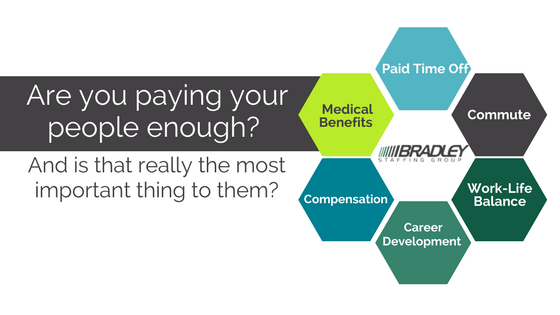Are You Paying Your People Enough? (And is that really the most important thing to them?)
October has arrived and business owners and managers are already thinking about the looming dread that comes with regulating office Halloween costumes. HR departments are facing a different kind of horror when it comes to issues like salary increases and pay equity. The Bureau of Labor Statistics reported that the unemployment rate fell to a new post-crisis low of 4.2%. It is expected to reach 4.0% by early 2018, ahead of projections. In a tight labor market such as this, it’s becoming more evident that employers will have to take a more aggressive approach to attracting and retaining talent. The need to create more attractive benefits and compensation packages and ward off attrition is greater than ever. There are a variety of factors that influence how satisfied individuals are in their jobs, and what will attract a top performing employee to your organization. When it comes to job satisfaction, money is important, but it isn’t everything.
What is the magic number?
Harvard Business Review published the results of a survey by Payscale, which revealed that most people have no idea whether they are paid fairly. 64% of those surveyed who are actually paid at market, believe that they are paid below market average. 45% of people who are paid above market actually believe they are paid at market value. Not surprisingly, the survey revealed that attrition decreased in relation to how favorable an employee felt about their pay. 60% of those employees who perceived they were underpaid said they planned to leave their job. As they did in 2016, U.S. employers are expected to raise salary budgets by around 3% this year to meet cost of living requirements. According to Payscale, the current average salary for an Executive Administrative Assistant is $48,575 per year. Our firm specializes in filling this position, and the most qualified EA candidates have a great deal of leverage when negotiating their salaries in this market. Employers need to extend higher offers early in the hiring process to win the type of candidates that will help grow their business.
The long term benefit of benefits packages
In the event that your organization isn’t as able to be competitive with salaries, you may be able to attract and retain employees in other ways. Many smaller businesses feel that they cannot afford to offer benefits packages. Unfortunately, pinching pennies in this area can cost you the kind of talent that will help grow your business over time. The most sought-after candidates today have higher salary demands AND expect a solid benefits package to accompany their offer. Offering perks like the ability to work from home, a 401K/retirement plan or paid maternity/paternity leave add significant value to your total compensation package. According to the Society for Human Resource Management (SHRM), a well-designed employee benefits package can help restore loyalty, drive employee engagement and encourage workers to stay on the job. This is especially important to retention when more than 1 in 5 workers are looking to change jobs in 2017. It is also crucial to attracting new talent. If your offer to an A-level candidate in today’s market doesn’t include at least some of these additional benefits, you will most likely lose them to another organization.
Factors driving job satisfaction
The voluntary quit rate reached 3.2 million in July, indicating that employees have a much greater sense of confidence in their ability to secure a new position in the current market. According to the Bureau of Labor and Statistics, employees are only staying in a job on average for 1.5 years, so retention is getting more difficult across every industry. Employees will leave jobs they love for reasons like disagreements with management or co-workers. Organizations can take measures to prevent turnover, but they have to first understand and recognize those factors which contribute to it. Quality of the employee-supervisor relationship, clarity about the role, job design and company culture are major driving factors to job satisfaction. A competitive salary will help bring new talent to your organization, but it will take more than that to keep them. Employees place a lot of emphasis on these less tangible elements of an organization, so simply increasing wages alone will not guarantee retention. To hire and keep the best candidates, employers will have to take steps to analyze these non-monetary components of employee satisfaction and make improvements where necessary.
In closing, data from a survey report shared by SHRM shows that base pay and benefits had a weaker relationship with the organization’s ability to foster high levels of employee engagement and motivation compared to nonfinancial incentives, intangible rewards and quality of leadership. A competitive salary is definitely important to gaining the most sought-after candidates. Employers will also need to provide a package that focuses on non-monetary needs to ensure they keep top talent in their organizations.
Bradley Staffing Group is a full-service staffing firm based in Wayne, PA. We are committed to matching A-level talent with best-in-class businesses. Our knowledgeable and well-trained staff brings a combined 70+ years of staffing experience to our clients and candidates alike. http://useful-sock.flywheelsites.com/employers/











Leave a Reply